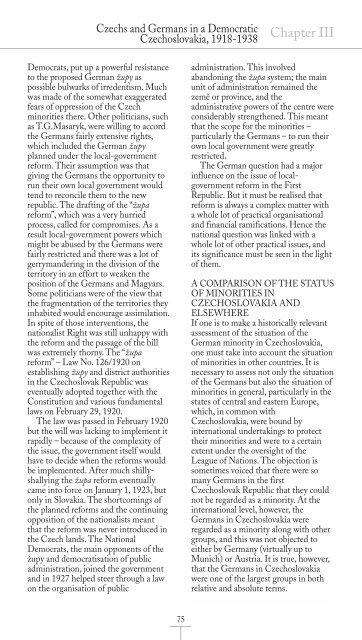the nationality of all inhabitants of the czech provinces and ...
the nationality of all inhabitants of the czech provinces and ...
the nationality of all inhabitants of the czech provinces and ...
Create successful ePaper yourself
Turn your PDF publications into a flip-book with our unique Google optimized e-Paper software.
Czechs <strong>and</strong> Germans in a Democratic<br />
Czechoslovakia, 1918-1938<br />
Democrats, put up a powerful resistance<br />
to <strong>the</strong> proposed German župy as<br />
possible bulwarks <strong>of</strong> irredentism. Much<br />
was made <strong>of</strong> <strong>the</strong> somewhat exaggerated<br />
fears <strong>of</strong> oppression <strong>of</strong> <strong>the</strong> Czech<br />
minorities <strong>the</strong>re. O<strong>the</strong>r politicians, such<br />
as T.G.Masaryk, were willing to accord<br />
<strong>the</strong> Germans fairly extensive rights,<br />
which included <strong>the</strong> German župy<br />
planned under <strong>the</strong> local-government<br />
reform. Their assumption was that<br />
giving <strong>the</strong> Germans <strong>the</strong> opportunity to<br />
run <strong>the</strong>ir own local government would<br />
tend to reconcile <strong>the</strong>m to <strong>the</strong> new<br />
republic. The drafting <strong>of</strong> <strong>the</strong> “župa<br />
reform”, which was a very hurried<br />
process, c<strong>all</strong>ed for compromises. As a<br />
result local-government powers which<br />
might be abused by <strong>the</strong> Germans were<br />
fairly restricted <strong>and</strong> <strong>the</strong>re was a lot <strong>of</strong><br />
gerrym<strong>and</strong>ering in <strong>the</strong> division <strong>of</strong> <strong>the</strong><br />
territory in an effort to weaken <strong>the</strong><br />
position <strong>of</strong> <strong>the</strong> Germans <strong>and</strong> Magyars.<br />
Some politicians were <strong>of</strong> <strong>the</strong> view that<br />
<strong>the</strong> fragmentation <strong>of</strong> <strong>the</strong> territories <strong>the</strong>y<br />
inhabited would encourage assimilation.<br />
In spite <strong>of</strong> those interventions, <strong>the</strong><br />
nationalist Right was still unhappy with<br />
<strong>the</strong> reform <strong>and</strong> <strong>the</strong> passage <strong>of</strong> <strong>the</strong> bill<br />
was extremely thorny. The “župa<br />
reform” – Law No. 126/1920 on<br />
establishing župy <strong>and</strong> district authorities<br />
in <strong>the</strong> Czechoslovak Republic was<br />
eventu<strong>all</strong>y adopted toge<strong>the</strong>r with <strong>the</strong><br />
Constitution <strong>and</strong> various fundamental<br />
laws on February 29, 1920.<br />
The law was passed in February 1920<br />
but <strong>the</strong> will was lacking to implement it<br />
rapidly – because <strong>of</strong> <strong>the</strong> complexity <strong>of</strong><br />
<strong>the</strong> issue, <strong>the</strong> government itself would<br />
have to decide when <strong>the</strong> reforms would<br />
be implemented. After much shillysh<strong>all</strong>ying<br />
<strong>the</strong> župa reform eventu<strong>all</strong>y<br />
came into force on January 1, 1923, but<br />
only in Slovakia. The shortcomings <strong>of</strong><br />
<strong>the</strong> planned reforms <strong>and</strong> <strong>the</strong> continuing<br />
opposition <strong>of</strong> <strong>the</strong> nationalists meant<br />
that <strong>the</strong> reform was never introduced in<br />
<strong>the</strong> Czech l<strong>and</strong>s. The National<br />
Democrats, <strong>the</strong> main opponents <strong>of</strong> <strong>the</strong><br />
župy <strong>and</strong> democratisation <strong>of</strong> public<br />
administration, joined <strong>the</strong> government<br />
<strong>and</strong> in 1927 helped steer through a law<br />
on <strong>the</strong> organisation <strong>of</strong> public<br />
75<br />
Chapter III<br />
administration. This involved<br />
ab<strong>and</strong>oning <strong>the</strong> župa system; <strong>the</strong> main<br />
unit <strong>of</strong> administration remained <strong>the</strong><br />
země or province, <strong>and</strong> <strong>the</strong><br />
administrative powers <strong>of</strong> <strong>the</strong> centre were<br />
considerably streng<strong>the</strong>ned. This meant<br />
that <strong>the</strong> scope for <strong>the</strong> minorities –<br />
particularly <strong>the</strong> Germans – to run <strong>the</strong>ir<br />
own local government were greatly<br />
restricted.<br />
The German question had a major<br />
influence on <strong>the</strong> issue <strong>of</strong> localgovernment<br />
reform in <strong>the</strong> First<br />
Republic. But it must be realised that<br />
reform is always a complex matter with<br />
a whole lot <strong>of</strong> practical organisational<br />
<strong>and</strong> financial ramifications. Hence <strong>the</strong><br />
national question was linked with a<br />
whole lot <strong>of</strong> o<strong>the</strong>r practical issues, <strong>and</strong><br />
its significance must be seen in <strong>the</strong> light<br />
<strong>of</strong> <strong>the</strong>m.<br />
A COMPARISON OF THE STATUS<br />
OF MINORITIES IN<br />
CZECHOSLOVAKIA AND<br />
ELSEWHERE<br />
If one is to make a historic<strong>all</strong>y relevant<br />
assessment <strong>of</strong> <strong>the</strong> situation <strong>of</strong> <strong>the</strong><br />
German minority in Czechoslovakia,<br />
one must take into account <strong>the</strong> situation<br />
<strong>of</strong> minorities in o<strong>the</strong>r countries. It is<br />
necessary to assess not only <strong>the</strong> situation<br />
<strong>of</strong> <strong>the</strong> Germans but also <strong>the</strong> situation <strong>of</strong><br />
minorities in general, particularly in <strong>the</strong><br />
states <strong>of</strong> central <strong>and</strong> eastern Europe,<br />
which, in common with<br />
Czechoslovakia, were bound by<br />
international undertakings to protect<br />
<strong>the</strong>ir minorities <strong>and</strong> were to a certain<br />
extent under <strong>the</strong> oversight <strong>of</strong> <strong>the</strong><br />
League <strong>of</strong> Nations. The objection is<br />
sometimes voiced that <strong>the</strong>re were so<br />
many Germans in <strong>the</strong> first<br />
Czechoslovak Republic that <strong>the</strong>y could<br />
not be regarded as a minority. At <strong>the</strong><br />
international level, however, <strong>the</strong><br />
Germans in Czechoslovakia were<br />
regarded as a minority along with o<strong>the</strong>r<br />
groups, <strong>and</strong> this was not objected to<br />
ei<strong>the</strong>r by Germany (virtu<strong>all</strong>y up to<br />
Munich) or Austria. It is true, however,<br />
that <strong>the</strong> Germans in Czechoslovakia<br />
were one <strong>of</strong> <strong>the</strong> largest groups in both<br />
relative <strong>and</strong> absolute terms.


